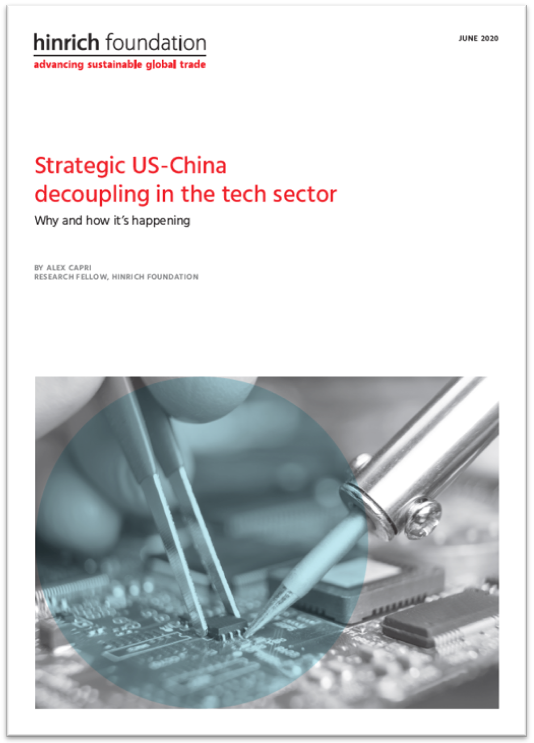Published 04 June 2020
The China-US geopolitical competition has reached a tipping point and morphed into a new “cold war”, even as extensive trade and commercial ties continue on uncertain terms. In this report we look at why US-China decoupling in the tech sector is inevitable and implications for multinational companies.
About the white paper
Ongoing tariff disputes which began in 2018 have resulted in supply chain decoupling from China. The trend has been accelerated by the 2020 coronavirus pandemic, and the tech sector has become ground zero for these trends.
A recent White House document laid out the prevailing bipartisan Washington mindset regarding China: “The CCP has chosen to exploit a free and open system and rules-based order and attempt to reshape the international system in its favor."
This white paper explores the implications for MNCs of US-China decoupling in the technology sector.
At the 2020 National People’s Congress, the CCP announced that in addition to doubling down on its Made in China 2025 and China Standards 2035 initiatives, it would spend an astounding US$1.4 trillion on a digital infrastructure public spending program. The program is intended to shore up China’s plans to dominate in technologies and industries of the future.
This is techno-nationalism on an unprecedented scale. Thus, as policymakers and business leaders outside of China contemplate this new reality, a new set of outcomes will emerge:
- Certain strategic value chains will decouple, restructure and diversify out of China.
- The US, EU and other state-actors will focus increasingly on countering Beijing’s economic nationalism with techno-nationalism initiatives of their own.
- Re-shoring and ring-fencing of some critical manufacturing will be unavoidable.
- New public-private partnerships, alliances and programs will need to emerge to compete with Chinese state and non-state actors.
- Multinationals will need to adjust to a world of increasingly fragmented and localized value chains.
- Businesses will have to adopt “in-China-for-China” business models if they wish to access the Chinese market.
The report comprises three sections:
Section I – Economic techno nationalism: The rise of Huawei (a case study)
Section I examines how the global technology landscape has come to be where it is today and presents the confrontation between Huawei and the US government as a microcosm of the larger issues fueling the US-China technology war. It examines Huawei’s meteoric rise and how subsidies, government-backed credit programs for customers, and the Digital Belt and Road Initiative contributed to the success of Huawei, and Chinese tech companies in general.
This section also examines how American and foreign multinational behavior regarding technology licensing and the offshoring of manufacturing shaped today’s global landscape and the rise of a new generation of world-class Chinese companies like Huawei and DJI, the world’s dominant maker of civilian drones.
Section II – Strategic decoupling, re-shoring and ring-fencing of key industries (TSMC case)
This section introduces the latest techno-nationalist countermeasures employed by the US, focusing on Washington’s leveraging of new export controls, before diving down into another Huawei-related high-profile case: Taiwan Semiconductor Manufacturing Company (TSMC) and its construction of a leading-edge microchip fabrication plant in the US.
This section explores the dynamics of re-shoring and ring-fencing of strategic industries and how this will impact state and non-state actors.
Section III – The China conundrum: Navigating an uncertain future landscape
Section III explores the uncertain landscape facing American and other foreign companies doing business in China. It continues with an analysis of Huawei, focusing on future scenarios involving retaliatory actions by the CCP on US and foreign companies, the “de-Americanization” of supply chains and finally, what may lie further over the horizon for American and foreign companies in the form of new public-private partnerships.
***
This report is part of a series of Hinrich Foundation papers, authored by Alex Capri, that review the implications of rising US-China techno-nationalism for global trade and international businesses. Our first paper focused on Semiconductors at the heart of the US-China tech war.
© The Hinrich Foundation. See our website Terms and conditions for our copyright and reprint policy. All statements of fact and the views, conclusions and recommendations expressed in this publication are the sole responsibility of the author(s).










